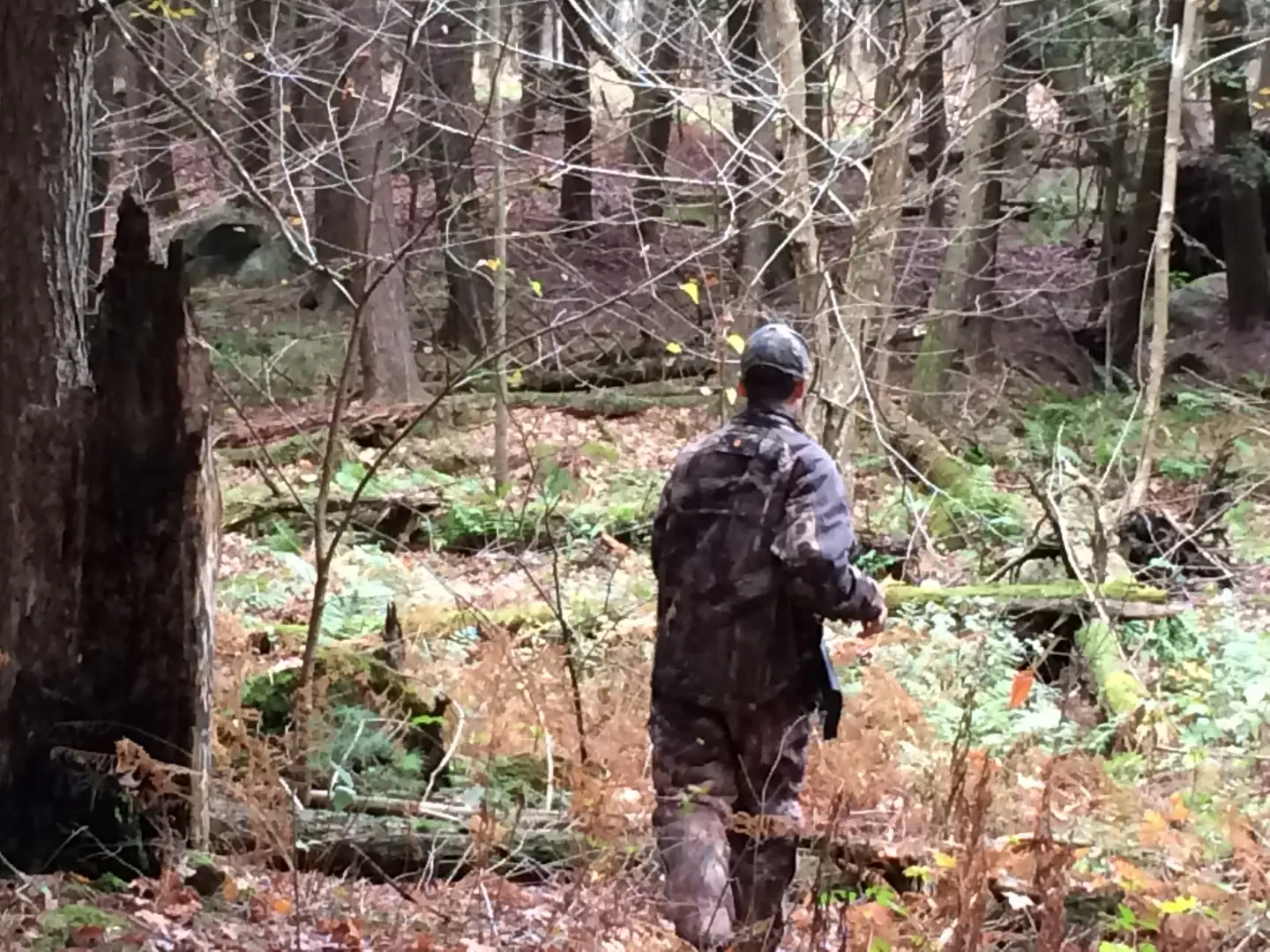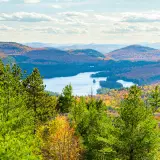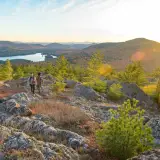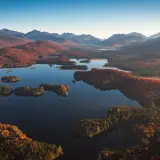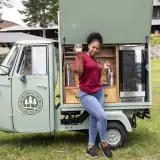The Oxford Dictionary defines hunting with this definition: “To pursue and kill a wild animal for sport or food." Here in the Adirondack Hub, and Adirondacks overall, the majority of residents hunt for the food first, and sport second. It is a way of life, and has been since the first settlers came here in the early 1800s. The ground was too rocky and sandy to farm. The families had to be rugged and tough, relying on their hunting and fishing skills to survive. Our forefathers farmed what little land they could and hunted in the fall to feed their families for the winters. Many of the great hunters became guides for the tourists that flocked to the Adirondacks in the early 1900s to experience the last of the wild wilderness.
Growing up at the original homestead of the Whitty’s at Schroon River Falls (north of Schroon Lake, just before the North Hudson town line), I was blessed with a father that took great pride in teaching me the skills to survive in the woods. Knowledge was passed down from his father, grandfather, and great-grandfather. John Whitty, my father’s great-grandfather, came to Schroon Falls sometime around the late 1830s from Ireland. His son Nicholas became one of the leading guides in this region for many years, and the Whitty home and farm became a boarding house during hunting season.
As early as I can remember, my father took me for hikes in the woods. Among other things, he taught me how to read the sun as we walked through the woods, a skill that still boggles my husband’s mind. To this day, I can wake up at any time of the morning and pretty much tell you what time it is by how much sun is coming in the windows and from what direction. Dad also taught us that the sun can tell you what direction you are going by studying where it is located that time of the day.
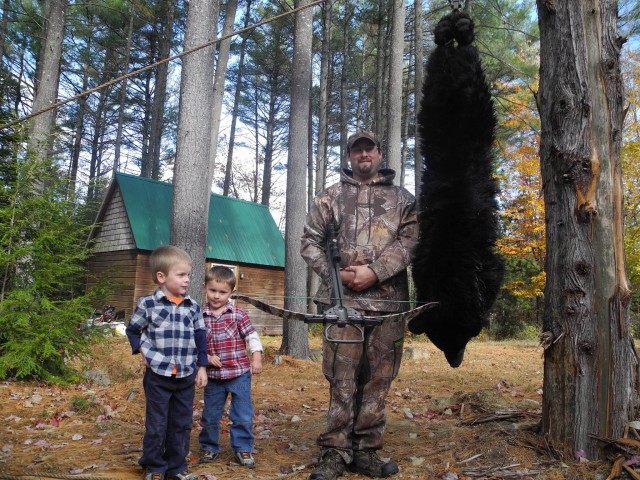
I not only learned to read the sun, but he taught me how to take shelter if I got caught in the woods for the night, how to look for moss on the trees (moss normally grows on the north side of the trees in the northern hemisphere due to less sunlight), how to build a fire with nothing, how to deal with wild animals if they approach, and how to track animals: watching for their prints, broken branches, bedded down grass, and their scat. I could identify animal scat (poop) by the time I was five or six. And the entire time these lessons were being taught and we were walking in the woods, he was telling me great hunting stories handed down from his father, grandfathers, and great-grandfathers. And I clung to every word.
Tradition
The first time I had a rifle placed in my hand I was approximately eight years old. Dad took me down to the field along the river at the homestead, set up some targets and loaded the 22 rifle. It took me very little time to figure out how to pick off all the cans. I was a natural. Over the next few years I practiced fine tuning my skills with the rifle, before long I was taking cans out one right after the next. I felt like I was on an old John Wayne movie set.
Finally the time came for me to attend my NY State Department of Environmental Conservation Hunter Training Course at the Schroon Lake Fish and Game Club in September of 1980 at the age 14. (I highly recommend every teenager take this course.) It was a long three days, learning many of the same skills my dad had already taught me, but learning more in-depth their importance to safety while hunting. I passed the final test with flying colors, making my father very proud. It not only felt good to be a sixth generation Whitty to be able to hunt, but I was one of only three girls in a class of twenty–seven boys and men that year.
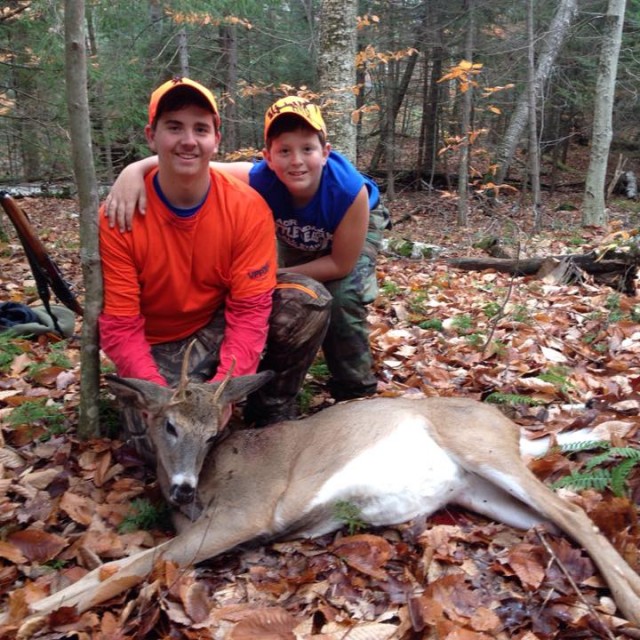
My first hunting trip with my father was for small game. For those of you that unfamiliar with the difference, let me explain. Small game includes wild animals and birds, such as squirrel and pheasant. We took our first trip down to the field by the Schroon River on the family property. I attempted to shoot a pheasant, but missed! I am here to tell you that shooting a bird that is in flight is not easy. It is certainly not like shooting a standing can on a fence post. Even though I missed, I was still ecstatic that I got to go because it meant time with my father; it meant I was part of a 6th generation tradition. Over the next two years we worked on my skills, honing them in; I learned to walk softly in the woods, not talk, control my breathing, not let my teeth chatter too loudly, and to find a great spot to sit and wait where I could be dry but not seen by the animals as they travel their worn paths.
In the fall of 1982, I was invited to finally go on my first big game hunt with my father and my paternal grandfather. The destination was the Boreas River just north of the Adirondack Buffalo Company and Elk Lake Lodge in North Hudson. I was a bit nervous because this meant venturing off the family property. It meant going into new terrain. Growing up on the Whitty property, I had hiked every nook and cranny, ran through the woods barefoot from June to September, could tell you where every animal hole was, where the poison ivy was, where the streams where, where otter played, etc. But this new terrain scared me!
Just the year before one of my schoolmates (from another great hunting family) had gotten lost with his father hunting on the Boreas. The young man spent two days out in that wilderness while they searched for him. It is a territory thick with evergreen. A man could walk in and disappear for days, weeks, months, maybe forever. However, I trusted my father, and believed his training would keep me safe, so we began to get ready for our big hunt the next morning.
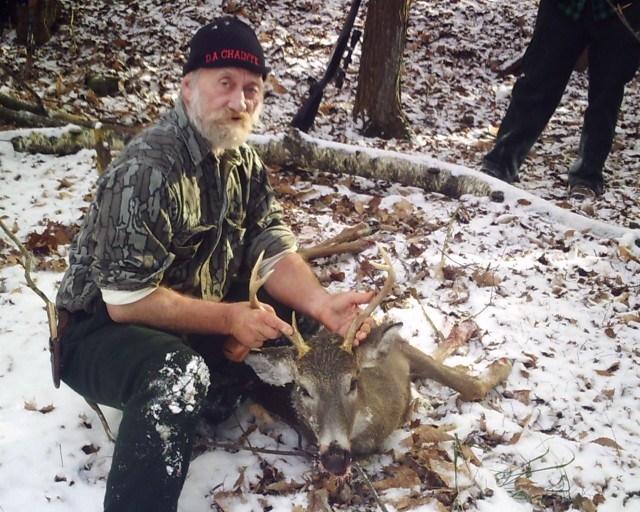
The morning dawned bright and early! As we stepped out of camp, the air was crisp, the ground frozen. We were bundled up; underwear, long johns, wool pants, heavy sweaters, wool jackets, wool gloves, Elmer Fudd style hat to keep our ears warm, hunting knife strapped to our sides, with our orange pocket tag bearing our hunting licenses proudly pinned to our backs. Our bellies were full with a good warm breakfast, our jacket pockets had jerky to snack on, string to tie off the deer intestines, waterproof matches (just in case), and our emergency toilet paper (YES! This is a must in the fall, leaves are pretty brittle and cold this time of the year). Our canteens with fresh water hung over our shoulders. Our ammo was in our belt, and our guns hung at our sides. We were ready for the hunt.
New grounds
As we took off my heart was pounding with excitement. I kept wondering if I was going to get my first deer (or bear) now that I was old enough to hunt big game. Was I finally going to be able to bring home food for my family like my great-grandfather, grandfather, and father had? I had my eyes open, and ears clearly tuned in as we headed up the side of the mountain through the evergreen.
I quickly went from being very excited to realizing that I needed to calm down and pay attention; the woods were swallowing my father up and I could not see him at times. Every time he disappeared I would gulp and feel a nagging feeling of dread in the pit of my stomach, but my mind would go back to the lessons he taught me.
We continued to hike deep into the wilderness, heading toward Lake Placid. We quickly found deer tracks, so we located a good place to hunker down and wait. The excitement I was feeling earlier quickly returned and I kept looking to the sky praying to my forefathers to send a nice big buck my way! Unfortunately, no amount of praying that day helped. No deer came prancing down the path!
Later in the afternoon we made our way back to camp, cold, hungry, and tired - very tired! But not disappointed! Even though we came home empty-handed we knew that we still had a couple more weeks to try, and we had had a great day of camaraderie together. I was blessed to have two men in my life that did not treat me like a girl. They treated me like a fellow hunter.
I never did bag my first buck during high school, and honestly I still haven’t. After graduation in 1984, I did not hunt again till 2008. I am now living back on family land and hope that this year my Henry Big Boy Rifle and I will take my first deer to fill our freezer for the winter. I did not avoid hunting all those years. I just never had time being a mother of three. However, I did try to teach my children as many of the lessons I had learned as I could.
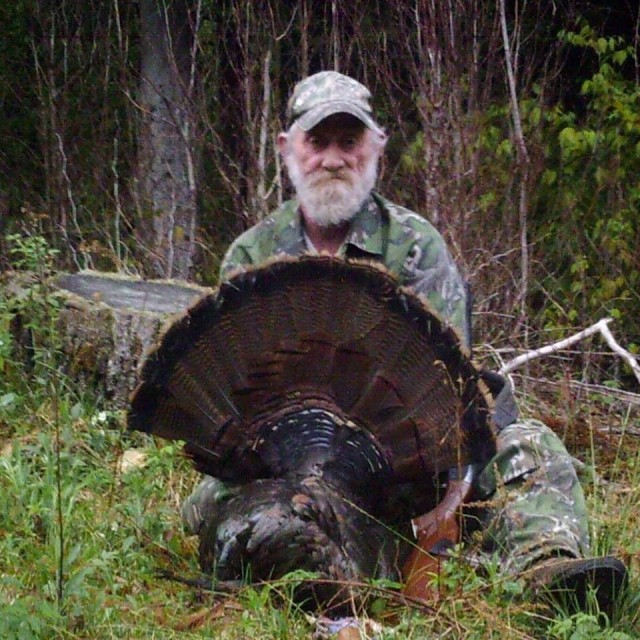
The children are all grown up now. My oldest daughter, son, and my step-son are avid hunters along with their spouses. My youngest daughter has been trained on how to properly use a firearm and, in time, when she and her husband leave the Navy and relocate to Michigan, I believe they too will hunt for food and sport. They understand that hunting is dangerous and a sport that should not be taken lightly and should always be respected. They also carry with them our family tradition of killing only what you need to feed your family or the families of others in need.
I am proud to have grown up in a region that is full of avid and responsible hunters. Just about every family I know feeds their family throughout the winter with the game they take. A tradition that has continued since the early 1800s.
If you are interested in hunting in the Adirondack Hub, I highly recommend taking advantage of one our our local guide services. Adirondack Mountain and Stream Guide Service, an exceptional four-season guide service, is run by the Frasier's, a father-son team with years of outstanding experience. They offer guided small game and big game hunting that is highly recommended by many of their past customers. Forever Wild Outfitters & Guide Service boasts generations of hunting & trapping experience, and is run by Fish and Game Club member Al Decesare, Jr. Contact the Schroon Lake Chamber for more information and business contact information.
Plan your upcoming hunting trip now - the woods are waiting for you to explore. You can hunt during the day and stay in one of our local accommodations. Or, if you are a seasoned hunter, you can set up an overnight camping/hunting trip with our knowledgable guides who will be happy to make your dream hunting trip in the Adirondacks come true. Have a safe and happy hunting season!
